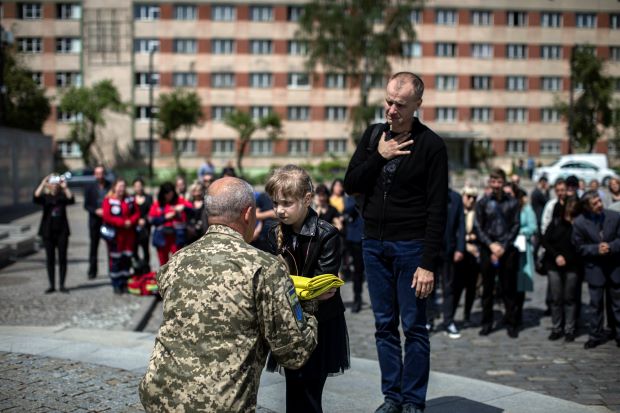After the fall of Mariupol, the fates of hundreds of fighters hang in the balance
By Marc Santora, Ivan Nechepurenko, Maria Varenikova and Valerie Hopkins
KYIV — The fate of the Ukrainian fighters who have held out for weeks at a steel plant in Mariupol remained uncertain Tuesday (17) after some laid down their weapons and were taken to Russian-held territory, and an undisclosed number of others remained inside.
The evacuation of fighters from the Azovstal steel plant was the product of extremely delicate and secretive negotiations between Russia and Ukraine. After more than 200 injured soldiers were evacuated overnight and transported to Russian-controlled territory, Ukrainian authorities said the fighters would soon be exchanged for Russian prisoners.
But in a statement Tuesday morning, the Russian Defence Ministry said nothing about a potential swap, saying that the Ukrainian servicemen, from the Azov battalion and from regular units, had “laid down their arms and surrendered.”
Inside Russia, there were calls not to release the soldiers but to place them on trial, underscoring the high stakes in the deal for President Vladimir Putin of Russia and President Volodymyr Zelenskyy of Ukraine. The Russian prosecutor general’s office asked the country’s Supreme Court on Tuesday to declare the Azov battalion a terrorist organization.
Even less clear was what was happening with hundreds of fighters who were believed to remain.
On Tuesday, Ukraine’s defence minister, Oleksii Reznikov, went on national television to praise the soldiers. “They are all heroes,” he said. “They now have a new order — to save their lives.” But as prisoners of war being held in Russian custody, their ultimate fate was not immediately known.
In the last communication from inside the plant, the garrison’s commander, Lt. Col. Denys Prokopenko, sounded philosophical and resigned to a terrible fate.
“The military decision-making process includes at least two scenarios,” he said. “You calculate the risks, weigh the pros and cons, and make the commander’s decision. The first priority is always the task. In the second place is always the preservation of life and health of personnel.”
The Ukrainian military said it would not specify how many soldiers remained inside the Azovstal steel factory while the complex “rescue operation” was underway. “The only thing that can be said is that the Ukrainian state is doing everything possible and impossible” to save the soldiers, Ukraine’s deputy defence minister, Hanna Malyar, said at a news conference Tuesday afternoon.
Aware of the deep symbolic place that the city and the garrison’s resistance now hold in public imagination, Reznikov sought to highlight just how vital a role they had played in the overall war effort.
“Thanks to the heroism of the Mariupol garrison, it was possible to withdraw the troops of the Russian occupiers from Kyiv,” he said, adding that their resistance inflicted huge losses and tied up thousands of Russian forces who could not be redeployed to other battlegrounds.
In Russia, the withdrawal carried its own symbolic value. The Azov battalion has been given outsize coverage by the country’s state-run news media, and its connection to far-right movements gave a veneer of credibility to the Kremlin’s false claims that its forces were fighting Nazis in Ukraine.
Overnight, pro-Kremlin commentators trumpeted the Ukrainian withdrawal as a potential turning point in the war that has frustrated many of them with its slow progress. They made no mention of the cost of capturing Mariupol: the destruction of the city and the death of thousands of its residents.
There were also calls for blood, with some saying that Russia should make no deal to save fighters who had killed so many Russian soldiers.
Anatoly Vasserman, a Russian lawmaker, proposed Tuesday that parliament pass a law banning an exchange of Azov fighters.
Vyacheslav Volodin, the State Duma speaker, said that committees of the Russian parliament were ordered to discuss a ban on “exchanges of Nazi criminals.”
“Our country has always treated humanely those who were captured or who surrendered,” Volodin said in a statement Tuesday. “But when it comes to Nazis, our position must remain unchanged: These are war criminals, and we need to do everything to bring them to justice.”
Igor Girkin, a conservative critic of the Kremlin’s war policy in Ukraine, said that such an exchange would be akin to “match fixing.”
“If in the coming days ‘the heroes of Azov’ will be covered with flowers in Kyiv, it won’t be possible to talk about anything else but another triumph of sabotage and idiocy in one bottle,” Girkin wrote on his channel on Telegram.
-New York Times


